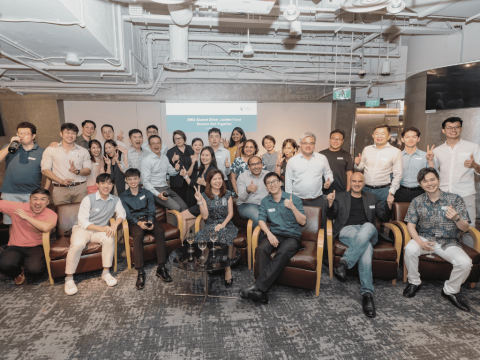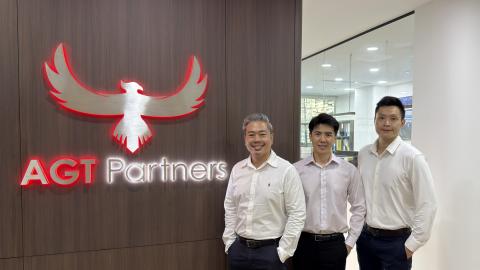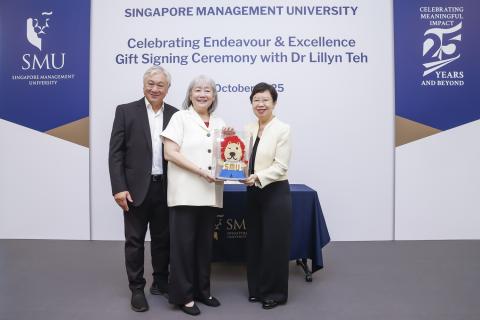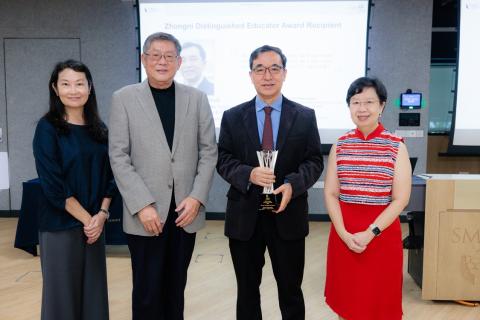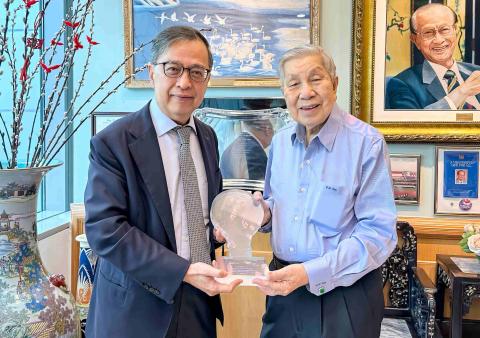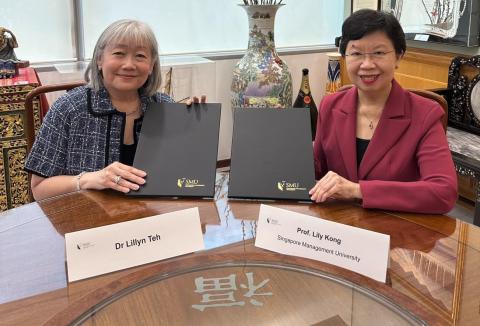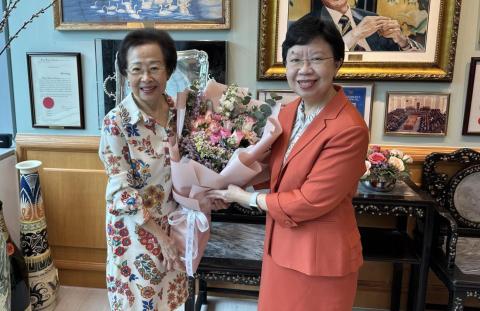Over S$17 million raised for the Sim Kee Boon Institute for Financial Economics at Singapore Management University
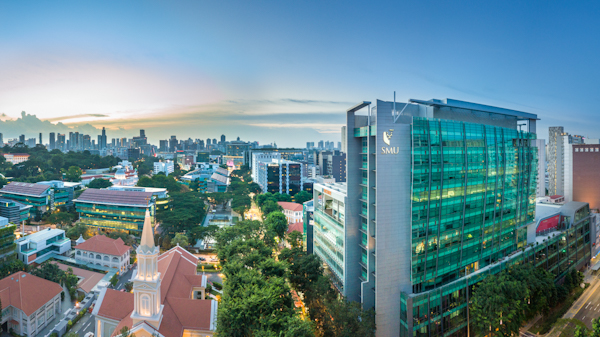
-
More than 60 corporations and individuals have contributed a total of S$17.2 million towards the endowment fund for the Sim Kee Boon Institute for Financial Economics at Singapore Management University (SKBI at SMU). The Institute has met the targeted $17 million endowment in less than six months since it was launched in July 2008. Contributions to the SKBI at SMU Endowment Fund receive a 1:1 matching grant from the government.
The Sim Kee Boon Institute for Financial Economics at SMU is named after the late Mr Sim Kee Boon, one of Singapore's founding generation of distinguished civil servants, to honour the many contributions he had made to the economy of Singapore. It is set up as a leading think-tank in the area of financial economics and financial econometrics in Asia, and is the first establishment in Singapore to be named after Mr Sim since his passing in November 2007. The endowment fund will support the Institute's success in achieving its objectives. The dedicated fund-raising efforts of the Institute's Fundraising Committee met with warm and enthusiastic response from Mr Sim's family, his friends and business associates, including his golfing partners. A fund-raising golf tournament organised by the Tanah Merah Country Club raised $800,000 in donations. In honouring Mr Sim, these contributions also affirm the belief in and support for the Institute. The founding benefactors of the Institute will be acknowledged at an appreciation dinner hosted by His Excellency S R Nathan, President of Singapore at the Istana this evening.
The Institute draws on SMU's strength and excellent track record in the study of economics and finance to advance research and education in financial economics, specifically in areas of strategic and practical application and relevance to industry, Singapore 's economy and the economies of the Asia Pacific. It will carry out its work in close collaboration with top scholars in economics and finance from around the world as well as with leading international organisations and experts from the industry.
Particular emphasis and attention is on Financial Econometrics – a discipline of growing importance and relevance to the financial services sector. Research on Silver Security, Asset Securitisation, and Investor & Corporate Responsibility, have also been identified for immediate focus in the study of these areas. Programmes and research are carried out collaboratively between SMU faculty and external experts, such as Professor Peter C. B. Phillips, Sterling Professor of Economics at Yale University, Distinguished Term Professor of Economics at SMU, Professors Olivia S. Mitchell and Susan Wachter from the Wharton School at the University of Pennsylvania, and with the world's top economists.
SKBI at SMU has been active in generating cutting-edge research and driving the education and development of a pool of local talent in financial economics. Since its launch, the Institute has hosted the Far Eastern and South Asian Meeting of the Econometric Society (FEMES) and the Singapore Econometrics Study Group Conference. Just last month, the Centre for Silver Security marked its launch with a conference on The Future of Silver Security: Coping with Crisis and Uncertainty. Some 60 participants discussed the issues of retirement planning in light of the current financial crisis with experts from universities, major insurance companies and the International Monetary Fund.
Moving forward, the Institute will embark on investor education initiatives in Singapore, training programmes and research in longevity risks and financial products for silver security, real estate and asset securitisation in Asia, corporate governance indices, as well as applications of econometric methodology in managing risks and pricing financial products.
Said Professor Howard Hunter, President of SMU, “SMU is very grateful to the Institute's fundraising committee led by Mr Lim Chee Onn, Executive Chairman of Keppel Corporation, and all the benefactors for their firm and unconditional support of the Institute. SKBI at SMU addresses frontier topics in Financial Economics and Econometrics ahead of global developments. Its work complements SMU's undergraduate and postgraduate education while taking to a higher level, collaborative research among world authorities and experts in economics and finance. It seeks to produce industry-relevant research that will catalyse continued economic growth of Asian economies, promote further global financial stability, and carry on the legacy of the late Mr Sim Kee Boon. We thank Mr Sim's family for dedicating such an honour to SMU.”
Said Professor Roberto S. Mariano, Dean, School of Economics, SMU and Founding Director of the Institute, “SMU has made commendable strides in research and education in the economics and finance disciplines. Through its research and training activities, undertaken with eminent scholars in partnership with industry experts, SKBI at SMU will establish and anchor Singapore as a major international site for academic and practical research in the field of Financial Economics. In the coming years, I look forward to presenting the valuable body of research and ideas generated by SKBI at SMU that will play an instrumental role in academic advancement and policy-making in Asia and beyond.”
The Institute's Fundraising Committee was led by Mr Lim Chee Onn, Executive Chairman, Keppel Corporation Ltd, as the Honorary Patron. Mr Lim will continue to advise and oversee the Institute's work as Chairman of its Advisory Board. He said, “This international learning platform in the Sim Kee Boon Institute for Financial Economics will contribute to Singapore's continued growth as a leading global financial hub. It is a befitting legacy to a visionary who has played an important role in the economy of Singapore.”
Annex: SKBI at SMU Fundraising Committee and Founding Donors
About the late Mr Sim Kee Boon (沈基文)
Mr Sim Kee Boon was a leading member of the founding generation of civil servants who, together with Singapore's political leaders, steered the nation through a period of turbulence and uncertainty to success and stability. His lifetime of dedication to serving the community, the state and society began when he joined the British colonial service upon graduation from Raffles College with a degree in Economics.
His distinguished public career spanned more than three decades. During this time he played a key role in the Ministry of Finance (1968–74), where he ably expanded Singapore's trade and economic relations around the globe, and the Ministry of Communications (1975–84), where he was deeply involved in the building of Changi International Airport from its inception. He is remembered as a perceptive talent scout who was successful in leading and inspiring his team.
Mr Sim was Head of the Civil Service (1979–84) and a member of the prestigious Council of Presidential Advisors (2001–06). He provided the stamina and enthusiasm required to turn barren reclaimed land into the highly respected Tanah Merah Country Club. Following his retirement from the Civil Service, he continued to play a vital role in the Singapore economy by turning a home-grown shipbuilding company, Keppel, into a global corporation.
Mr Sim passed away at the age of 78 on 9 November 2007, leaving behind his wife, Jeanette, five sons and five granddaughters.
About the Sim Kee Boon Institute for Financial Economics at SMU
2008 marks the establishment of the Sim Kee Boon Institute for Financial Economics at SMU. The Institute is a leading academy for research, education and training in the area of financial economics. Set up with generous donations from benefactors who had known or worked with the late Sim Kee Boon, the Institute has an endowment fund of $17 million. The Institute honours Mr Sim Kee Boon's many contributions to the State and business communities and perpetuates his legacy of tenacity, positive thinking, business acumen and the constant strive for excellence. Four centres reside within the Institute - Centre for Financial Econometrics, Centre for Silver Security, Centre for Corporate Governance and the Centre for Asset Securitisation. The Institute's research extends to industry partners, training and public education programmes to augment Singapore's efforts as a financial hub in Asia.
Director
Professor Roberto S Mariano
Professor of Economics and Statistics
Dean, School of Economics, SMUAssociate Director
Associate Professor Yu Jun
School of Economics, SMUCo-Principal Investigators, Financial Econometrics
Roberto S Mariano
Professor of Economics and Statistics
Dean, School of Economics, SMUPeter C B Phillips
Sterling Professor of Economics, Yale University
Distinguished Term Professor of Economics, SMUCo-Principal Investigators, Silver Security
Benedict Koh
Practice Associate Professor of Finance
Lee Kong Chian School of Business, SMUOlivia S Mitchell
Professor of Insurance & Risk Management
The Wharton School, University of PennsylvaniaCo-Principal Investigators, Asset Securitisation
Winston T H Koh
Associate Professor of Economics
Associate Dean, School of Economics, SMUSusan M Wachter
Richard B. Worley Professor of Financial Management
Professor of Real Estate and Finance
The Wharton School, University of PennsylvaniaCo-Principal Investigators, Corporate and Investor Responsibility
Jeremy Goh
Associate Professor of Finance
Lee Kong Chian School of Business, SMUPaul Malatesta
Norman J. Metcalfe Faculty Fellow in Finance
University of WashingtonAbout Financial Economics and Financial Econometrics
Financial Economics deals with the manifold economic aspects of financial markets, financial assets and market regulation. The subject is now in the vanguard of economic theory and econometrics. It has become a rich empirical discipline within the economics arena and its quantitative tools are employed throughout economics and in other social sciences. Financial Economics concerns itself with the valuation of financial assets, the markets in which they are traded, and their use by individuals, corporations, and society at large.
Financial Econometrics is the tool by which financial theory is made to confront the reality of observation, developing and applying statistical and mathematical techniques to analyse Financial Economics issues. The subject is a young and rapidly growing academic discipline with strong connections to the finance and banking industries. Recent years have witnessed huge advances in electronic databases, vast expansion in the range of financial markets, increasing complexity in financial products and services, and a growing demand for real-time financial analysis. Against the background of these changes, the demand for Financial Econometric tools for use in financial applications has mushroomed.
